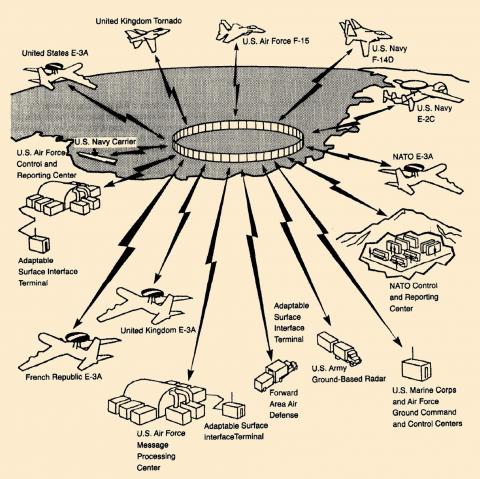A deal to purchase an upgraded naval vessel communications system worth NT$2.15 billion (US$68.18 million) has been finalized with the US government, a high-ranking Taiwanese military officer said yesterday.
The officer, who declined to be named, said the deal secured the purchase of upgraded Link-16 and Link-11 systems, which would connect the Republic of China (ROC) Navy directly to the command center for the US’ Pacific fleet.
The system will give the ROC Navy the ability to share coordinates and other information with the US Seventh Fleet during combat operations, the officer said, adding that the move ties the two navies closer together.

Image in the public domain provided by Wikimedia Commons
The systems are already in use by NATO members and the US’ other allies in the Pacific, the officer said, adding that information can be shared among all allies during combat operations should the need arise.
The US can direct all of its allies in the field to coordinate operations, the officer said.
The officer said some of the ROC Navy’s ships would use the Link-16 system, which will connect those ships to other vessels, land-based radar systems and other military installations.
Kidd-class destroyers, Cheng Kung-class frigates, Lafayette-class frigates and Knox-class frigates would all use the Link-16 system, the officer said, adding that missile-equipped patrol ships and support vessels would use the Link-11 system, which only connects with other vessels.
The officer said the deal was rushed through with coordination between the American Institute in Taiwan and military representatives stationed in the US, adding that shipment and installation of the systems are expected to be completed by June 2021.
The officer said that while the systems’ main components are to be acquired from the US, communications and photoelectric components would be produced by domestic manufacturers.
Democratic Progressive Party (DPP) Legislator Lo Chih-cheng (羅致政) said that control over information is at the heart of armed conflict.
An effective means to transmit information is fundamental to military strategy, Lo said, adding that the procurement of the Link-16 and Link-11 systems would greatly benefit the nation’s military.
DPP Legislator Wang Ding-yu (王定宇) said the process of military cooperation with allies in the region began late last year when Taiwan, Japan and the US communicated military aircraft identifier signal information with each other, adding that Japan included contingencies for a possible conflict in the Taiwan Strait among recent training activities.
Outcomes in modern military conflicts are decided within seconds, Wang said, adding that the systems would dramatically improve the military’s reaction time and allow for rapid coordination of movements.
Additional reporting by Aaron Tu

Right-wing political scientist Laura Fernandez on Sunday won Costa Rica’s presidential election by a landslide, after promising to crack down on rising violence linked to the cocaine trade. Fernandez’s nearest rival, economist Alvaro Ramos, conceded defeat as results showed the ruling party far exceeding the threshold of 40 percent needed to avoid a runoff. With 94 percent of polling stations counted, the political heir of outgoing Costa Rican President Rodrigo Chaves had captured 48.3 percent of the vote compared with Ramos’ 33.4 percent, the Supreme Electoral Tribunal said. As soon as the first results were announced, members of Fernandez’s Sovereign People’s Party

EMERGING FIELDS: The Chinese president said that the two countries would explore cooperation in green technology, the digital economy and artificial intelligence Chinese President Xi Jinping (習近平) yesterday called for an “equal and orderly multipolar world” in the face of “unilateral bullying,” in an apparent jab at the US. Xi was speaking during talks in Beijing with Uruguayan President Yamandu Orsi, the first South American leader to visit China since US special forces captured then-Venezuelan president Nicolas Maduro last month — an operation that Beijing condemned as a violation of sovereignty. Orsi follows a slew of leaders to have visited China seeking to boost ties with the world’s second-largest economy to hedge against US President Donald Trump’s increasingly unpredictable administration. “The international situation is fraught

MORE RESPONSIBILITY: Draftees would be expected to fight alongside professional soldiers, likely requiring the transformation of some training brigades into combat units The armed forces are to start incorporating new conscripts into combined arms brigades this year to enhance combat readiness, the Executive Yuan’s latest policy report said. The new policy would affect Taiwanese men entering the military for their compulsory service, which was extended to one year under reforms by then-president Tsai Ing-wen (蔡英文) in 2022. The conscripts would be trained to operate machine guns, uncrewed aerial vehicles, anti-tank guided missile launchers and Stinger air defense systems, the report said, adding that the basic training would be lengthened to eight weeks. After basic training, conscripts would be sorted into infantry battalions that would take

GROWING AMBITIONS: The scale and tempo of the operations show that the Strait has become the core theater for China to expand its security interests, the report said Chinese military aircraft incursions around Taiwan have surged nearly 15-fold over the past five years, according to a report released yesterday by the Democratic Progressive Party’s (DPP) Department of China Affairs. Sorties in the Taiwan Strait were previously irregular, totaling 380 in 2020, but have since evolved into routine operations, the report showed. “This demonstrates that the Taiwan Strait has become both the starting point and testing ground for Beijing’s expansionist ambitions,” it said. Driven by military expansionism, China is systematically pursuing actions aimed at altering the regional “status quo,” the department said, adding that Taiwan represents the most critical link in China’s